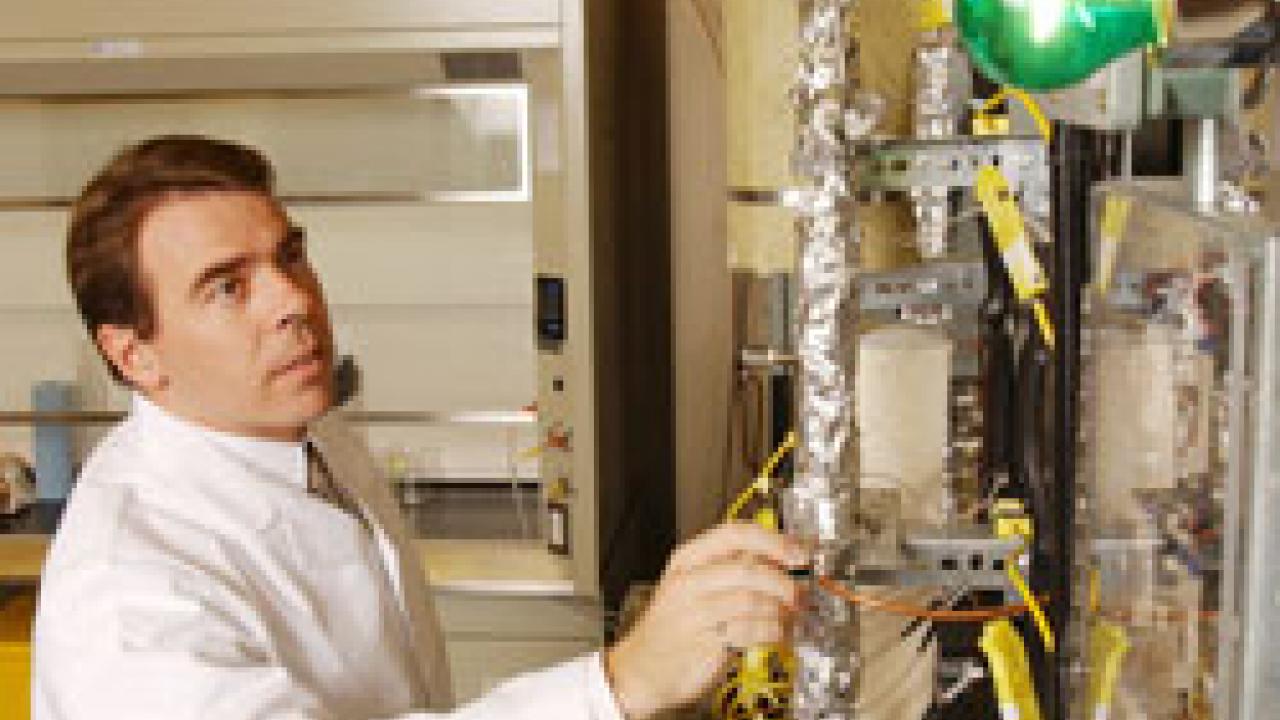If high spirits could power automobiles, UC Davis transportation researchers would have a boundless fuel supply. With new faculty and funding boosting already prestigious teaching and scientific programs, the Institute of Transportation Studies starts this academic year as a dominant international player in a field of rising political and social importance.
“In advanced transportation studies, this is a time of great expectations,” said institute founder and director Daniel Sperling.
“Nearly a century after gasoline-powered autos replaced grain-powered horses, we are investigating whether fuel-cell engines should replace internal-combustion engines. And we don’t know the final answer. We may be helping launch a future where cars, trucks and buses run on renewable energy and give off only water vapor, or we may end up steering transportation in an entirely different direction. At UC Davis we have more people working on those investigations than any other university in the world.”
Under Sperling’s leadership, the 12-year-old institute built its early reputation on supplying emissions data and predictions to the California Air Resources Board. The air board’s subsequent requirements that automakers sell cleaner-running cars in California became a national model.
The institute pioneered the research methods now widely used to quantify the “well-to-wheels” environmental effects of energy use in transportation. In 21 reports, ITS-Davis chronicled the social costs of transportation — from air pollution to land consumption for parking lots — that must be considered in many forums of policy and planning. Federal grants began flowing from the Department of Energy. Sperling and development director Joe Kovoza developed partnerships with virtually every major domestic and international energy and auto company. Institute faculty members now advise industry and governments internationally on the energy and environmental impacts of transportation.
This year, 40 UC Davis faculty members and 70 graduate students are affiliated with the institute. The faculty hold appointments in the departments of civil and environmental engineering, mechanical and aeronautical engineering, environmental science and policy, and economics, the Graduate School of Management, and others. The institute also directly hosts 12 research faculty.
With state funding drying up, ITS-Davis increasingly is turning to the private sector and the federal government. Industry funding reached $1.5 million last year, accounting for almost a third of the overall budget.
New faculty
One of the institute’s new faculty members this fall is Joan Ogden, considered by many to be the premier U.S. analyst of hydrogen energy. She came to Davis from Princeton University and is an associate professor in environmental science and policy. At the transportation institute she is co-director of the Hydrogen Pathways research program.
Ogden expects to teach undergraduate and graduate courses in energy policy, policy analysis and hydrogen-energy systems. “My research centers on understanding how a transition might occur from our current transportation system toward one based on hydrogen,” Ogden said.
Yueyue Fan, who just received her doctorate in civil engineering from the University of Southern California, is a new assistant professor in civil and environmental engineering. Fan applies mathematics to transportation infrastructure, such as roads and bridges, and studies ways to create more efficient transport networks.
Sperling said strong partnerships between the institute and the academic colleges have been a cornerstone of the institute’s recruiting success. “With strong and visionary leadership from the College of Engineering and the College of Agricultural and Environmental Sciences, we have been able to recruit outstanding new faculty who benefit both the campus and our transportation research agenda.”
New vehicles
Paul Erickson, an expert on fuels reformation who became a Davis assistant professor of mechanical and aeronautical engineering last fall, just took delivery of the first liquid-fueled fuel-cell bus ever built (and second fuel-cell bus of any type). Originally a research project at Georgetown University, the bus is powered by a phosphoric-acid fuel cell that operates on methanol rather than the proton-exchange-membrane (PEM) fuel cell in wider use today. Erickson is using the elderly 1994 bus for teaching and research on fuel-cell durability and degradation.
Erickson recently received a $500,000 grant from the U.S. energy department to test the feasibility of producing hydrogen from coal-derived methanol using the latest reformation technologies.
Fuel cells need very clean, high-quality fuel, which typically has not been easily achievable from coal. If Erickson can get clean fuel from coal, he said, “it allows (the United States) to diversify our energy portfolio using domestic fuel.”
A second new bus will appear on Davis streets this fall. Wearing a colorful “wrap” that advertises its status as a vehicle powered by hydrogen-enriched natural gas, this bus is a collaborative research project between ITS-Davis, the student-run Unitrans bus system and the Federal Transit Agency. The bus will provide regular service on Unitrans routes and be tested by ITS-Davis for fuel economy, power and ability to meet new California bus emissions standards taking effect in 2007.
Also, the institute will soon receive a second fuel-cell-powered Toyota SUV for its research and teaching programs. ITS-Davis’ first fuel-cell Toyota has been constantly busy with public outreach events and initial research since it was launched early this year.
UC Davis will use both Toyotas to conduct the first public evaluation of American consumer reactions to the new automotive technology.
Cars powered by fuel cells have zero tailpipe emissions and greatly reduce greenhouse gases compared with existing internal-combustion engines using gasoline or diesel.
New home
Plans are underway for the institute and the College of Engineering to build a new home for advanced environmental vehicle research. This building would house UC Davis’ clean-vehicle research and education programs. It would include high-bay vehicle laboratory space, a distributed computing facility and a hydrogen refueling station. The preliminary cost estimate is $10 million to $12 million.
